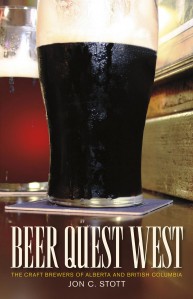 Jon Stott may have just written the book I should have if I had got my butt in gear. If you haven’t heard yet, he has just published Beer Quest West, a new book that offers a comprehensive overview of beer made in Alberta and B.C. (and Yukon). In a way the choice of B.C.’s advanced craft brewing scene and Alberta’s nascent one is odd. But it might be explained by the fact that Jon lives in Edmonton. And he has time on his hands. Jon, a retired English professor, toured almost every brewery and brewpub in the two provinces, interviewing key figures at each. The result is this book.
Jon Stott may have just written the book I should have if I had got my butt in gear. If you haven’t heard yet, he has just published Beer Quest West, a new book that offers a comprehensive overview of beer made in Alberta and B.C. (and Yukon). In a way the choice of B.C.’s advanced craft brewing scene and Alberta’s nascent one is odd. But it might be explained by the fact that Jon lives in Edmonton. And he has time on his hands. Jon, a retired English professor, toured almost every brewery and brewpub in the two provinces, interviewing key figures at each. The result is this book.
It is a beer-lover’s kind of book. Don’t expect much of a story line. It is as much a living encyclopedia of beer in the two provinces as anything. He methodically creates entries for every brewery, rigorously telling their story, using as many of brewers’ own words as possible. He non-judgmentally describes their beer and generally provides a casual look inside each brewery. You come away feeling that you know the brewers and can feel their passion.
Stott is no beer snob, and he definitely respects quite deeply the men and women who sacrifice and slave to produce quality craft beer in western Canada. That respect comes through in the writing. The prose is clean and works hard to stay out of the way of the breweries.
BQW finds a way to share the history and philosophy of each brewery in such a fashion that a clear personality for each shines through. You see the people behind the mash tuns, and that makes all the difference in making the book personable and human. I can also say given my knowledge of the Alberta brewers that the book is accurate and reliable with its factual information. I trust it is the same for B.C.
As an aside, the careful reader will be able to learn much about brewers’ perceptions of the beer market in the west. I lost count of how many breweries emphasized the need for “accessible” beer and cautioned not to be too extreme or “out-there” because their local beer market wasn’t ready for that. It may speak to the work that is yet to be done around these parts. Or it may speak to a subtle hesitance on the part of the breweries to push their market forward. They know their people better than I do, so I will refrain from concluding.
Stott knows this book is not about him, and so refrains from editorializing, something that may cause differing reactions among readers. At times I was hoping he would offer a bit more analysis and commentary on his observations. I think it would have brought the book to life a bit more. However, it is a rare opportunity to see micros featured with honest reportage, and I admire Stott’s restraint.
His restraint may go a bit too far when it comes to the beer tastings. He is careful to only describe what he tastes and not offer anything that could be construed as a “review”. It makes those sections of the book rather extraneous at times. While I don’t think he should trash beer or go on at length about his opinion, I think some reference points and context might aid the reader in deciding whether it is the kind of beer they want to try. To that end, I wonder if Stott was unclear about his audience. This is a book for beer fans, and some more forthright beer appreciation would enhance the book.
I also found myself wanting a little more “travel” in the book. Stott drove to most of the breweries profiled and must have had some entertaining stories that could add colour and give a better sense of the communities these breweries are serving. He offers some short orientational introductions, but I find they only serve to whet my appetite for more local flavour.
The west was long overdue for a book of this nature. Something that profiles our craft beer culture, encourages people to try what is in our backyard (or next door), and celebrates the quiet success of the west’s craft breweries. Stott handles the task with a light touch, an honest passion for good beer and the sensibility of someone who knows there is always time for another beer before going.


May 11, 2011 at 4:43 PM
Shouldn’t you be reading Habermas? 🙁